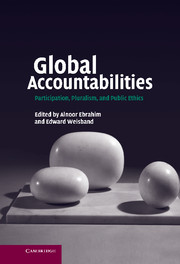Book contents
- Frontmatter
- Contents
- List of tables
- List of figures
- Acknowledgments
- List of contributors
- 1 Introduction: forging global accountabilities
- Part I Public accountability: participatory spheres from global to local
- Part II Experiments in forging NGO accountability: mutuality and context
- Part III Reflective accountability: new directions for participatory practices
- 8 A rights-based approach to accountability
- 9 Evaluation and accountability in emergency relief
- 10 Towards a reflective accountability in NGOs
- Part IV Global accountability frameworks and corporate social responsibility
- Index
- References
9 - Evaluation and accountability in emergency relief
Published online by Cambridge University Press: 22 September 2009
- Frontmatter
- Contents
- List of tables
- List of figures
- Acknowledgments
- List of contributors
- 1 Introduction: forging global accountabilities
- Part I Public accountability: participatory spheres from global to local
- Part II Experiments in forging NGO accountability: mutuality and context
- Part III Reflective accountability: new directions for participatory practices
- 8 A rights-based approach to accountability
- 9 Evaluation and accountability in emergency relief
- 10 Towards a reflective accountability in NGOs
- Part IV Global accountability frameworks and corporate social responsibility
- Index
- References
Summary
NGOs are at present challenged as never before to demonstrate results. For organizations involved in humanitarian relief work, one reason often given for needing more documentation of results and more accountability is a growing dependence on public money. Ian Smillie's reckoning, for example, is that: “by the early 1990s, 75 percent of British food aid was being channeled through NGOs, and 40 percent of Swedish spending on emergencies and refugees was going through Swedish NGOs. By 1996, 46 percent of French emergency funding was being spent through NGOs, and half of all the EU's European Community Humanitarian Office (ECHO) funding was being spent the same way. Between 1992 and 1997 the United States Agency for International Development (USAID) – with the largest emergency budget in the world – spent over 60 percent of it, not counting food aid, through NGOs” (Smillie and Helmich, 1999, p. 9). Yet some of the NGOs with the strongest accountability cultures are the same ones that are taking the lowest amounts of public money. Thus the motivations or “drivers” for accountability within NGOs are more nuanced and complex than the role of public money; financial drivers are not determinative.
This chapter focuses on evaluation systems in NGOs – how they use evaluation, and how it can both enable and constrain accountability.
- Type
- Chapter
- Information
- Global AccountabilitiesParticipation, Pluralism, and Public Ethics, pp. 168 - 192Publisher: Cambridge University PressPrint publication year: 2007
References
- 7
- Cited by



